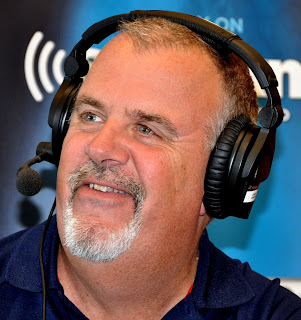Less than two weeks ago, NASCAR Executive
Vice President Steve O’Donnell appeared to lay
down the law in the aftermath of a post-race skirmish between Kyle Busch and
Joey Logano at Las Vegas Motor Speedway.
O’Donnell, the sport’s chief spokesman in times
of strife and upheaval, warning that the sanctioning body would not tolerate
any on-track retaliation and would react strongly to instances of drivers using
their car as weapons.
Just days later, the sanctioning body failed to
act when Austin Dillon did exactly that, squeezing Cole Custer’s car into the
outside wall under caution at Phoenix Raceway after Custer inadvertently
wrecked Dillon late in Saturday’s NASCAR Xfinity Series race.
NASCAR
parked Dillon for the remainder of the event – a token penalty, since his car was
already too damaged to continue – then declined to assess any further sanctions
or penalties.
“Don’t
do it again,” was the official response. “Or else.”
That
mixed message leaves drivers and fans to wonder exactly what is – and isn’t –
allowed these days, especially in the aftermath of a similar no-call for the
pit road imbroglio between Busch, Logano and their respective crews a week
earlier.
"Every situation is different" said O’Donnell
last week, insisting that drivers know where the line lies between acceptable
behavior and actionable offense.
Unfortunately, the drivers say they don’t.
 |
| Dillon wrecked Custer under caution |
“I don't know that it gives us an answer of
what we can or can't do,” said Ryan Newman, Dillon’s teammate at Richard
Childress Racing. “You have to do what's best, and what's best is not always
the same in everybody's eyes. Being aggressive -- whether it's with your race
car or your hands -- doesn't always lead to the answer. But it sometimes gets
your point across, and sometimes that's what's needed.”
Dale
Earnhardt, Jr., also weighed-in on NASCAR’s response, saying, “It's not about
trying to teach (Dillon) a lesson. It's really (about) what we are trying to
tell everyone else, all the other drivers.
"I
know NASCAR takes these guys into the haulers,” he added. “They have conversations
with them and tell them what they expect in the future, But no one else is
privy to that conversation. That is not sending the message to anyone, because
we don't know what the message is.”
NASCAR has fined drivers
for fighting in the past. They have also declined to do so.
NASCAR has fined drivers for intentionally
damaging competitors’ cars -- under green or under caution – in the past. They
have also declined to do so.
 |
| O'Donnell: "No two incidents are alike." |
It’s all a matter of degree. And in
the words of William Shakespeare, “There’s the rub.”
As is often the case, NASCAR finds itself in an
untenable position. The sanctioning body is expected to rule consistently on a
series of incidents – both on and off the race track – that vary wildly in both
severity and circumstance. Fists are different than fenders, and high-speed takeouts
are different than harmless bouts of post-race fender rubbing.
No two incidents are alike, and no written rule
can cover the myriad ways that drivers express displeasure with each other.
“I don't particularly envy NASCAR's position,”
said former Monster Energy NASCAR Cup Series champion Brad Keselowski last
week. "There is something to be said for our responsibility in this sport
to be role models, and I'm as guilty as anyone else of not doing the best job
of that, sometimes.
"We're all trying to ask ourselves… 'What's
too much emotion?' I'm not sure anyone has really got a great answer to that.”
Clearly, NASCAR cannot allow its garage area to
degenerate into a 700-horsepower version of the OK Corral, with drivers and
team members taking matters into their own hands with impunity. They also
cannot afford to take the emotion out of the sport, however, turning speedways
into Safe Zones where conflict and disagreement are strictly forbidden.
Somewhere in the middle lies a line between acceptable
and unacceptable. Unfortunately, that line isn’t always straight.
"I
got punched in the face and I still race hard," said Keselowski, harkening
back to a 2014 dustup with Jeff Gordon that left him battered, bruised and
unpenalized. "Everybody has got their own way of looking at it."
“There
is a very fine line" said Dillon with a smile. "I have morals of my
own. I try to stick by a moral code that my family brought me up by. Everybody
makes mistakes and NASCAR did a good job being a father-like figure to me in
this situation. They expected more out of me… (and) I need to handle the
situation differently.
“I
really don't know what to do,” he smiled. “I haven't gotten my UFC license yet.”

















